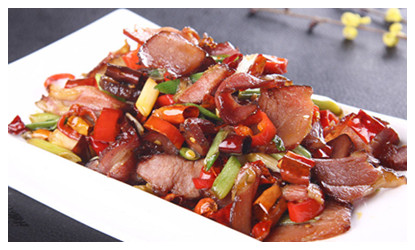Skype: neodalle-travel
Tel: +86 135 7447 2266
E-mail: sales@zhangjiajieholiday.com

 Around the Chinese Lunar New Year, cured meat can be seen hanging in almost every household, whether it is in the mountainous areas of western and northwestern Hunan, or in the alluvial plains of central and northern Hunan. It is just not a Hunan Chinese Lunar New Year's Eve feast without the smoked meat! It represents the product of climate, geography, and human resourcefulness, the integration of nature and customs. It is as if a strong, unseen force has determined the long-lasting lifestyle and eating habits of Hunan people.
Around the Chinese Lunar New Year, cured meat can be seen hanging in almost every household, whether it is in the mountainous areas of western and northwestern Hunan, or in the alluvial plains of central and northern Hunan. It is just not a Hunan Chinese Lunar New Year's Eve feast without the smoked meat! It represents the product of climate, geography, and human resourcefulness, the integration of nature and customs. It is as if a strong, unseen force has determined the long-lasting lifestyle and eating habits of Hunan people. A common argument is based on geography and climate. Surrounded by mountains and hills, Hunan is U-shaped, open to the north. The result is a typically damp climate where meat can easily rot or mildew. Locals early on discovered ways to preserve meat and for many years have used several methods including to slowly cold smoke the meat, hang it outdoors or bury it in a barn.
Cured meat (pronounced "La rou" in Chinese) gets its name as it is generally prepared in winter or in the twelfth lunar month (which is pronounced "La Yue" in Chinese), around the Chinese Lunar New Year Smoked meat is thus a food associated with New Year feasts. Making it in the cold winter weather is that it keeps the meat from getting maggots or going moldy.
Livestock sacrificing, a part of ancestor worship ceremony, is often held in the twelfth lunar month before Chinese Lunar New Year. The pre-Chinese Lunar New Year pig sacrifice ritual is still carried out in some regions of Hunan, and the surplus meat is cured and stored for the coming year.
 Ask Questions ?
Ask Questions ?